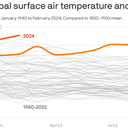Earth had its warmest February on record as ocean temperatures smashed major milestone

Earth just had its warmest February on record, and its warmest 12 month period, according to new data released Thursday.
Why it matters: The new statistics confirm that so far, 2024 is beating 2023's record warmth and that of prior years like 2016.
Zoom in: According to the Copernicus Climate Change Service, an EU organization, February was the ninth month in a row to rank as the globe's warmest on record.
- The month's global average surface temperature was 1.77°C (3.2°F), warmer than the estimated February average for the pre-industrial era of 1850-1900.
- The global average temperature for the past twelve months, beginning in March of last year, is also the hottest on record, at 1.56°C (2.8°F) above pre-industrial levels.
Context: This is significant, since these 12 months exceeded the Paris Agreement's 1.5-degree target for a full year. However, the pact is aimed at averting multiple decades above that level, meaning the target hasn't yet been officially breached.
- Europe was especially warm compared to average during February, along with central and northwest North America, much of South America, Africa and western Australia, Copernicus found.
Stunning stat: The average global sea surface temperature for February was the highest for any month on record, beating August 2023.
- The ocean temperature record is partly related to a now-waning El Niño event in the tropical Pacific Ocean, which has helped boost global temperatures on top of human-caused global warming.
The intrigue: A separate report out Thursday from Climate Central examined how much human-induced climate change can be linked to some of the unusually high temperatures during the December through February period worldwide.
- This interval constitutes meteorological winter in the Northern Hemisphere.
- The report, based on the group's peer-reviewed "Climate Shift Index," found that human emissions of CO2 and other greenhouse gases "drove abnormal warmth experienced by 59% of humanity" during this period, the nonprofit climate research and communications group said.
- More than half of the world's population, or about 4.8 billion people, were exposed to at least one day with temperatures "that would be virtually impossible" without the human influence, the research found.
Between the lines: Climate Central's index shows how warming skews the likelihood of certain temperatures being met in today's climate versus the globe prior to the industrial revolution.
- For 1.7 billion people worldwide, daily temperatures during December through February reached the maximum CSI Index value of 5 at least 31 times, the report notes.
- That means these places had a month or more of warmth made at least five times more likely by emissions from burning fossil fuels such as coal, oil and natural gas, among other sources, Climate Central found.
Go deeper: The world's hottest year may soon be an average one